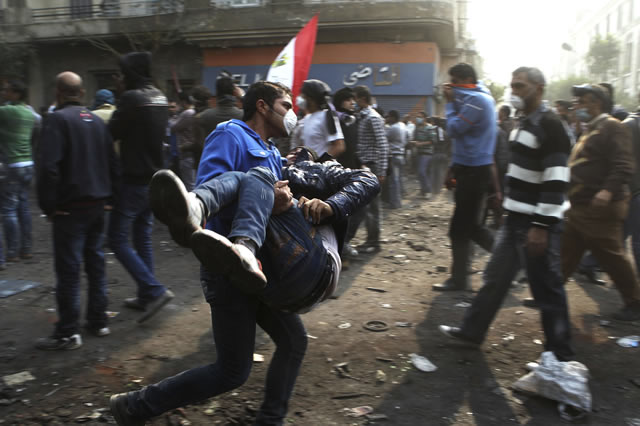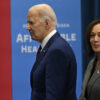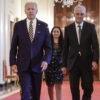
A protester carries another affected by tear gas thrown by police during clashes between protesters and police near Tahrir Square in Cairo November 22, 2011.
Egypt experienced its third day of bloody clashes on Monday, the worst explosion of political violence since the ouster of President Hosni Mubarak last February. The riots were provoked by a clumsy government attempt on Saturday to forcibly eject protesters from Cairo’s Tahrir Square—the epicenter of Egypt’s “Arab Spring” protests. Tens of thousands of demonstrators stormed back into the square to battle police and army personnel. At least 23 protesters reportedly were killed and more than 1,000 were injured, as police resorted to live ammunition in repeated confrontations with the angry crowd.
The protesters were galvanized by the slow pace of reform and repeated efforts by the ruling Supreme Council of the Armed Forces (SCAF) to preserve and expand the army’s role in setting Egypt’s political course. When it ousted Mubarak and formed an interim government in February, the SCAF promised to hand back power in six months. Now it insists that it will remain in power until after the drafting of a new constitution and presidential elections, which it tentatively has scheduled for late 2012 or early 2013.
There is a danger that the crisis could disrupt Egypt’s parliamentary elections, which are slated to begin November 28 and continue in phases through March. Some critics charged that the SCAF provoked the clashes to fashion a pretext for postponing the elections, while others expressed concern that interim government would not be able to provide security for the polls.
The Revolutionary Youth Coalition, an umbrella group of pro-democracy movements, called for a “million-man march” on Tuesday to support its demand that the SCAF resign immediately and hand power to a national unity government.
The cabinet of the interim government offered to resign on Monday, but the offer was not immediately accepted by the SCAF, which appears reluctant to lose the façade of civilian leadership that masks the army’s leading role, which has continued since Colonel Gamal Abdel Nasser’s military coup in 1952.
The SCAF, which has ham-handedly over-reached in an effort to preserve the army’s institutional interests and shield it from civilian oversight, now must make major concessions to calm the tense political situation and facilitate the parliamentary elections. Unfortunately, even if the SCAF survives this crisis, the army’s weakened political status is likely to undermine its ability to act as a restraining influence on the Islamist political parties that are widely expected to win the most votes in the coming elections.



























